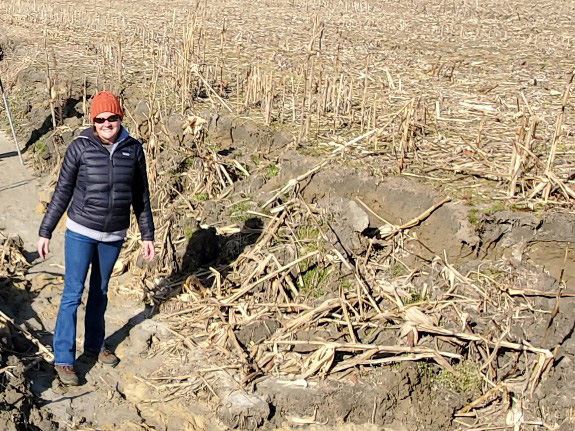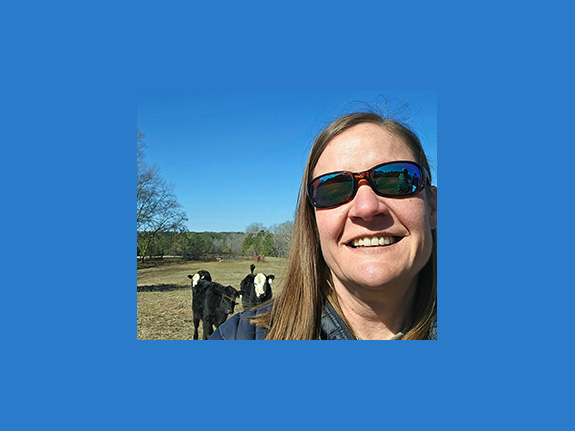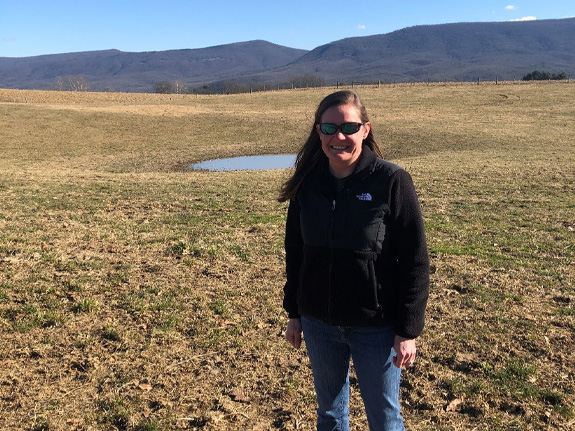
 Department of Conservation and Recreation
Department of Conservation and Recreation
Conserve. Protect. Enjoy.
 Department of Conservation and Recreation
Department of Conservation and Recreation
By Emi EndoPosted February 11, 2025
Meet four women trained in science, technology, engineering and mathematics (STEM) disciplines who found careers following their passions at DCR.
Chief Biologist, Virginia Natural Heritage Program


Education: B.S. Biology Furman University; M.S. Wildlife Biology Auburn University
Scientific discipline: Zoologist, Manager
Current work: I work with professional botanists, vegetation ecologists, cave and karst scientists, and zoologists to identify and map Virginia’s rarest species, natural vegetation communities and significant geological features. My team also advises partners on conservation and protection actions that will promote the flourishing of these natural heritage resources and our state’s overall biodiversity.
What inspired you to work in science?
My first experience with field work came as an undergraduate at Furman University. My first field class taught me about recognizing species, describing habitats and behaviors, and asking questions about them. It also instilled in me a foundation for answering questions by gathering data and information. While in graduate school at Auburn University, I learned about the network of Natural Heritage programs and how they were attempting to use field collected data about species and communities to help address the conservation of biodiversity. My first job as a field zoologist for the Virginia Natural Heritage Program solidified my passion to conserve biodiversity based on our best knowledge and data. It has been 28 years of pursuing that passion since then.
What advice would you like to offer girls or women who aspire to work in science?
My advice to women starting off in a science career is to enjoy your work because of personal interests and fulfillment, and because of the larger purpose it serves. I joke that I have ‘never worked a day in my life’ because I love what I do and more importantly, why I do it.
Second, advocate for yourself. Don’t be afraid to ask for more training, more responsibilities, more money. But be OK if the answer is ‘no’ or ‘not yet.’ The important thing is to let your co-workers and supervisors know you are interested in improving and growing in your role. Lastly, realize you have good things to say and to add to a conversation so speak up, ask questions, and listen. Be a good communicator.
Spatial Ecologist, Virginia Natural Heritage Program



Education: B.S.; M.S. Isfahan University of Technology, Isfahan, Iran; Ph.D. in Natural Resource Management, South Dakota State University
Scientific discipline: Environmental science with a focus on remote sensing, GIS and data analysis.
Current work: My work involves using maps, satellite images and data tools to track environmental changes, assess wildlife habitats and identify areas for conservation or restoration. I collaborate with scientists and conservation groups to provide insights that help guide environmental planning and decision-making.
Who inspired you to work in science?
My journey into science was shaped by my family and mentors. My dad taught me how to be strong, brave and independent, my mom believed in my potential, and my older brother who also is in science provided inspiration. Seeing my brother’s dedication motivated me to pursue my own scientific journey. When I started environmental science, my female professors were important role models who demonstrated how I could make real impact. Observing their efforts and involvement in international research, along with the respect they earned for their contributions was truly inspiring. Through these experiences combined with my growing passion for the environment, my commitment to this field was further strengthened.
What advice would you like to offer girls or women who aspire to work in science?
Believe in yourself even when things get tough. Failures are part of growth, so trust the process and keep pushing forward. If you have a goal, stay committed even when things don’t go as planned. Keep learning, stay curious, and know that your journey matters.
District Engineering Services Manager, Soil and Water Conservation



Education: B.S. Mechanical Engineering, Virginia Commonwealth University
Scientific discipline: Engineering
Current work: As the District Engineering Services Manager, I oversee the team responsible for providing engineering assistance to all 47 Soil and Water Conservation Districts. We provide engineering services for agricultural BMPS, structures such as animal waste storage sheds, hardened stream crossings and alternative watering systems. We also provide the engineering services to operate and maintain 104 flood control dams owned by the Districts.
Who inspired you to work in your scientific field?
My passion for conservation and science began at a very early age. I was fortunate to be in an advanced math and science program in elementary school. My teacher was passionate about conservation long before it was “cool.” I remember learning about water conservation, erosion and the impacts it had on the environment, and recycling. This led to a very early interest for conservation and the environment, and I knew that my career path would be something science- and math-related. Fast forward to my freshman year of college, I started college undeclared as I didn’t know specifically what I wanted to do, just that it would include science, math, and conservation. My freshman chemistry professor, who worked full time at Honeywell as a chemical engineer, wrote on one of my exams “you should be an engineer!” That’s when I started to look into the various engineering fields. While I majored in Mechanical Engineering, my license is in Civil Engineering with a specialty in Water Resources and Environmental, and this has allowed me to follow my passion for the outdoors and conservation. I could not imagine doing anything else!
What advice would you like to offer girls or women who aspire to work in science?
I think when most people think of engineering, they picture factories and desk jobs. While there are plenty of engineering jobs out there that are mostly indoors, there are just as many that are not. If you have a passion for the outdoors and the environment, and you think that engineering is boring or just desk work, you'd be surprised how many engineering jobs allow you to be outdoors. Ignore people who look past you and don’t take you seriously. Be the top engineer on the construction site. Be a leader, be confident, and follow your dreams and passions.
Senior Vegetation Ecologist, Virginia Natural Heritage Program




Education: B.S. Biology, Hendrix College (Conway, Arkansas); M.S. Ecology, North Carolina State University
Scientific discipline: Vegetation Ecology
Current work: I work with an awesome team of botanists, zoologists, karst scientists, and vegetation ecologists with the shared mission of cataloging the plants, animals, unique geological features, and native ecosystems of Virginia, assessing their status and condition, and prioritizing their conservation needs. I guide all aspects of the natural community ecology team’s work on finding new and evaluating known locations of exemplary natural communities, vegetation mapping on the state’s Natural Area Preserves and Virginia State Parks, and consultation with private and governmental landowners / managers regarding conservation of high priority ecosystems.
Our work centers around the application of The Natural Communities of Virginia, a statewide vegetation / ecosystem classification that defines ecosystem targets for inventory and biodiversity conservation. The part of my job that brings me the most satisfaction (and joy) is conducting field inventories across the state to identify examples of significant natural communities and – hopefully – seeing these places protected from development and other threats.
Who inspired you to work in science?
My parents were both scientists. My dad, a physician, and my mom, an environmental educator and all-around naturalist. My mother instilled in me a curiosity and fascination with the natural world from a very early age.
What advice would you like to offer girls or women who aspire to work in science?
Be curious. Learn as much as you can about as many areas of science as you can. Find something you are passionate about. Seek out experiences with those who are working in that field. Observe. Ask questions. Show others that you are passionate and engaged. Never stop learning. Question and test your assumptions. There is never a single answer.
Envision the career you want and make it happen. Seek out mentors and collaborators that you admire and like to be around — people who make you feel good and build you up, not tear you down.
Story contributors include:
Content & Social Media Manager Haley Rodgers
Senior PR and Marketing Specialist Matt Sabas
Categories
Conservation | Land Conservation | Natural Heritage | Nature | Soil and Water Conservation

